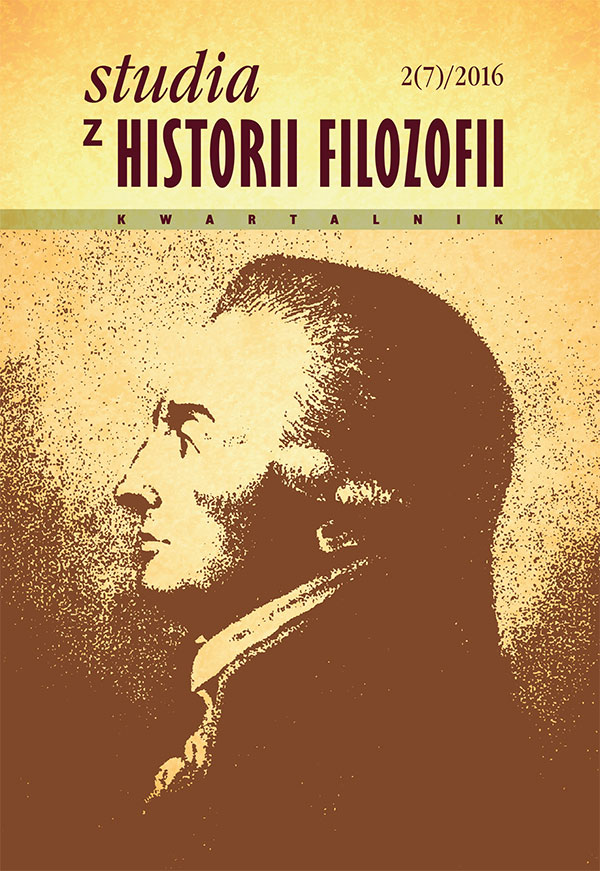Rola wyobraźni w Hume`owskiej nauce o naturze ludzkiej. Od teorii poznania do etyki i estetyki
DOI:
https://doi.org/10.12775/szhf.2016.029Słowa kluczowe
Hume, teoria poznania, etyka, estetyka, idee, zasady kojarzeniowe, związki idei, wyobraźnia, smakAbstrakt
Celem niniejszego artykuły jest przedstawienie roli związków kojarzeniowych wyobraźni w Hume`owskiej nauce o naturze ludzkiej. Zagadnienie to analizuję na gruncie jego rozważań teoriopoznawczych, etycznych i estetycznych. Hume był pierwszym myślicielem, który tak szeroko próbował wykorzystać asocjacjonizm do opisu najważniejszych sfer aktywności ludzkiej, a przy tym był przekonany, że jest to jego największe naukowe osiągnięcie. Wskazanie na sposoby, w jakie wyobraźnia łączy ze sobą poszczególne idee, pozwoliło mu wyjaśnić mechanizmy nią rządzące jako część jego modelu ludzkiej natury.Bibliografia
Anderson R. F., Hume’s Account of Knowledge of External Objects, „Journal of the History of Philosophy” 1975, vol. 13, no. 4.
Árdal P., Passion and Value in Hume’s Treatise, Edinburgh University Press, Edinburgh 1966.
Arystoteles, O pamięci i przypominaniu sobie, [w:] tenże, Dzieła wszystkie, t. 3, przeł. P. Siwek, PWN, Warszawa 1992.
Bailie J., Hume on Morality, London−New York 2000.
Berkeley G., Próba stworzenia nowej teorii widzenia, [w:] tenże, Próba stworzenia nowej teorii widzenia i inne eseje filozoficzne, przeł. A. Grzeliński i in., WN UMK, Toruń 2011.
Bricke J., Hume’s Philosophy of Mind, Princeton 1980.
Costa M. J., Hume and Causal Realism, „Australasian Journal of Philosophy” 1989, vol. 67, no. 2.
Costelloe T. M., Hume, Kant, and the Antinomy of Taste, „Journal of the History of Philosophy” 2003, vol. 41, no. 2.
Davidson D., Hume’s Cognitive Theory of Pride, „The Journal of Philosophy” 1976, vol. LXXIII, no. 4.
Deleuze G., Empiryzm i subiektywność. Esej o naturze ludzkiej według Hume’a, przeł. K. Jarosz, Warszawa 2000.
Flew A., Hume’s Philosophy of Belief. A Study of His First Inquiry, New York 1961.
Friday J., Hume’s Sceptical Standard of Taste, „Journal of the History of Philosophy” 1998, vol. 36, no. 4.
Glathe A., Hume’s Theory of the Passions and of Morals, Berkeley−Los Angeles 1950.
Grzeliński A., Angielski spór o istotę piękna. Koncepcje estetyczne Shaftesbury’ego i Burke’a, Toruń 2001.
Grzeliński A., Człowiek i duch nieskończony. Immaterializm George’ a Berkeleya, WN UMK, Toruń 2010.
Grzeliński A., Kategorie „podmiotu” i „przedmiotu” w Dawida Hume’ a nauce o naturze ludzkiej, Wydawnictwo UMK, Toruń 2005.
Hume D., Badania dotyczące rozumu ludzkiego, przeł. J. Łukasiewicz i K. Twardowski, PWN, Warszawa 1977.
Hume D., Rozprawa o uczuciach, przeł. A. Grzeliński, „Filo-Sofija” 2009, nr 1 (8), s. 267.
Hume D., Sceptyk, [w:] Eseje z dziedziny moralności i literatury, przeł. T. Tatarkiewiczowa, PWN, Warszawa 1955.
Hume D., Sprawdzian smaku, [w:] Eseje z dziedziny moralności i literatury, przeł. T. Tatarkiewiczowa, PWN, Warszawa 1955.
Hume D., Traktat o naturze ludzkiej, przeł. Cz. Znamierowski, Aletheia, Warszawa 2005.
Hutcheson F., An Essay on the Nature and Conduct of the Passions and Affections, with Illustrations on the Moral Sense (1742), ed. A. Garrett, Liberty Fund, Indianapolis 2002.
Jedynak S., Hume, Warszawa 1974.
Kearns Th. K., “General Rules” in Hume’s Treatise, „Journal of the History of Philosophy” 1970, no. 8.
Kopania J., Funkcje poznawcze Descartes’a teorii idei, Dział Wydawnictw Filii UW w Białymstoku, Białystok 1988.
Locke J., Myśli o wychowaniu, przeł. F. Wnorowski, Ossolineum, Wrocław−Kraków 1959.
Locke J., Rozważania dotyczące rozumu ludzkiego, przeł. B. J. Gawecki, PWN, Kraków 1955.
Morawski S., O podstawowych zagadnieniach estetyki angielskiej XVIII w., [w:] Studia z historii myśli estetycznej XVIII i XIX w., Warszawa 1961.
Ossowska M., Dawid Hume jako obserwator i kodyfikator moralności, [w:] Myśl moralna oświecenia angielskiego, Warszawa 1966.
Pyka M., O uczuciach, wartościach i sympatii. David Hume, Max Scheler, Univeristas, Kraków 1999.
Rorty Amelié O., ‘Pride Produces the Idea of Self ’: Hume on Moral Agency, „Australasian Journal of Philosophy” 1990, vol. 68, no. 3.
Rutkowski M., Krytyka oceny moralnej w etyce Davida Hume’a, „Studia Filozoficzne” 1990, nr 1.
Rutkowski M., Rola rozumu w decyzjach moralnych. Etyka Davida Hume’a, Warszawa 2001.
Rutkowski M., Teoria „bezstronnego obserwatora” w etyce Dawida Hume’a, „Studia Filozoficzne” 1989, nr 5.
Savile A., Hume, Kant and the Standard of Taste, [w:] Kantian Aesthetics Pursued, Edinburgh 1993.
Shaftesbury, An Inquiry Concerning Virtue, or Merit (1699), [w:] Characteristics of Men, Manners, Opinions, and Times, ed. D. Den Uyl, Indianapolis 2001.
Shaftesbury, Moraliści, [w:] tenże, List o entuzjazmie. Moraliści, przeł. A. Grzeliński, WN UMK, Toruń 2007.
Szewczyk J., Krytyka teorii przyczynowości Dawida Hume’a, Kraków 1980.
Tulejski T., Konserwatyzm bez Boga. Dawida Hume’a wizja społeczeństwa, państwa i prawa, Fijorr Publishing, Chicago−Warszawa 2009.
Wawrzonkowski K., Teoria estetyczna w Hume`owskiej nauce o naturze ludzkiej, „Filo- Sofija” 2006, nr 1(6), ss. 207−222.
Wawrzonkowski K., Wyobraźnia i wzniosłość. Teoriopoznawcze podstawy wybranych brytyjskich koncepcji estetycznych XVIII wieku, Wydawnictwo TAKO, Toruń 2010.
Wieand, Hume’s Two Standards of Taste, „Philosophical Quarterly” 1997, vol. 47, no. 1.
Yolton J. W., The Concept of Experience in Locke and Hume, „Journal of the History of Philosophy” 2002, vol. 40, no. 1.
Zabieglik S., Z filozofii szkockiego oświecenia, Gdańsk 1997.
Pobrania
Opublikowane
Jak cytować
Numer
Dział
Statystyki
Liczba wyświetleń i pobrań: 720
Liczba cytowań: 0



